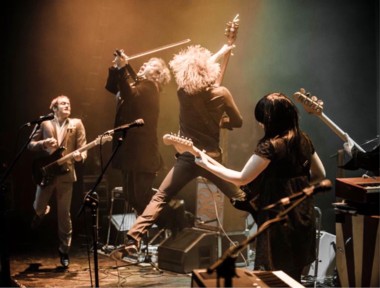In the late ’80s and early ’90s, one version of The Waterboys—a moniker which has mostly meant Mike Scott and Anthony Thistlethwaite plus various supporting casts—became widely known, thanks to two albums paying homage to traditional Irish music through original compositions and arrangements of traditional songs. Those albums, Fisherman’s Blues and Room to Roam, represented a new and exuberant sonic direction in the Waterboys’ career, and they brought the band widespread acclaim and a flowering of new fans.
For a lot of listeners, those two albums are the only ones deemed worthy of a spot in the rotation, because the band’s earlier work, though it’s distinctive and like little else, isn’t as immediately accessible as the Irish-fueled material. All the same, its conjuring of a world of Old Gods and heartfelt poetry, often driven by ragged guitar and screaming sax, offers plenty of rewards, particularly in its most introspective moments, typefied by soulful tunes like “This Is the Sea” and a haunting slow version of the song “Don’t Bang the Drum.”
After the Waterboys’ years of major rock-trad success, the band dissolved, only reforming a few years later, in 2000. Since then, Scott has continued to steer an idiosyncratic path through rock and folk, driven by the same spiritual concerns and literary sensibility that have always filled his music. The more recent sounds combine the Waterboys’ early rock approach (often referred to as “the Big Music,” after an early single) and the later folky direction. That doesn’t create a dull similarity, but rather an adventurous, unpredictable bent: put in a newer Waterboys disc and you’re never quite sure what kinds of textures to expect. You may get distorted guitars, fiddles, flutes, piano, or acoustic contemplativeness.
The latest iteration of the Waterboys is largely American, and was assembled to tour the album that’s been brewing in Scott’s mind for a long time. It’s called An Appointment With Mr. Yeats, and comprises musical settings of W.B. Yeats poems, something Scott first offered with a folky take on “The Stolen Child” during the band’s traditional Celtic phase. Not all the tunes on Mr. Yeats take flight—not surprising with an endeavor as difficult as translating inflexible lines of poetry into the framework of a song. Fortunately, Yeats’ work lends itself better than most to music, and it’s hard to imagine a better musical fit or poetic affinity than Scott’s, so when the tunes work, they work in an almost magical fashion, resurrecting the fiery, lush sensibility of Yeats’ words in grand style.
The album opener, “The Hosting of the Shee,” is a propulsive combo of Yeats’ words with a pounding, insistent rhythm section and washes of organ and guitar punctuated by horns. It’s a bombastic and infectious starting point. The textures of the album are widely varied, sounding symphonic at times, poppy at others. The instrumentation is many-layered and rich. Scott presides over the tunes with his edgy, ragged voice, and the tunes’ success or lack thereof often rests on his success in delivering the tumble of Yeats’ words over the musical arrangements. In the best tunes, you’d never know the lyrics began as poems. At times, Scott sounds like an actor in a carnivalesque musical, at other times like a Celtic bard channeling some ancient, stony past. Regardless of its inconsistencies, the album is something of a triumph, a beautifully realized manifestation of Scott’s ancient/modern concerns.
The current version of the Waterboys visits the Calvin in Northampton this Friday, and word is that current set lists, though centered on Mr. Yeats, dig well back into the band’s catalogue.•
Sept. 20, 8 p.m., $25-45, with opener Freddie Stevenson, Calvin Theatre, 19 King St., Northampton, (413) 586-8686, www.iheg.com.



